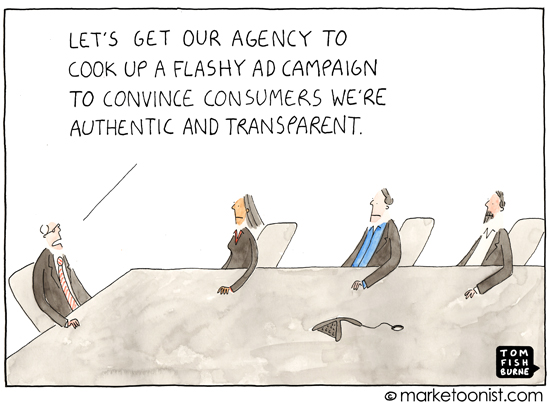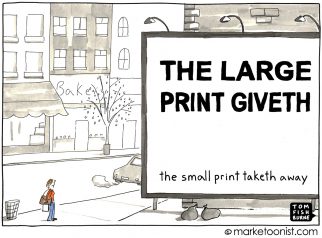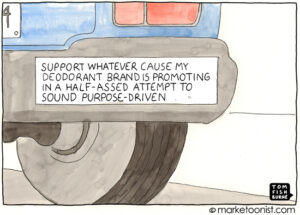Authenticity and transparency are two of the biggest marketing buzzwords right now (and have been gaining steam for a while). Nearly every case study and talk coming out of Cannes last week seemed to reference authenticity as a theme.
Like any marketing bandwagon, some brands are applying the lessons superficially at best. There’s a difference between sounding authentic and being authentic. Brands can’t fake authenticity, at least not for long.
It will take more than a Southern accent for British Petroleum to redeem its image in the Gulf states. BP has taken a lot of heat for its current campaign, trumpeting “the best tourism season in years.” Many have called it BP propaganda.
BP is definitely an extreme case, but I think there’s a watch-out there. Brands often come across as insincere when they are trying hardest to sound authentic and transparent.
Authenticity means more show, less tell.
(Marketoonist Monday: I’m giving away a signed print of this week’s cartoon. Just share an insightful comment to this week’s post by 5:00 PST on Monday. Thanks!)



Alan Berkson says
I call this “brand dissonance” — when you say or do things at odds with the core narrative with which people are familiar. If they can’t connect the dots (and they won’t try that hard) then it’s not going to be effective.
Rupert Bowater says
All too true. To adapt it for Internal comms, just replace ‘consumers’ with ’employees’ and ask the agency to make it look cheap / like you didn’t spend too much.
bob collins says
“well done is better than well said” (benjamin franklin)
Larry McManis says
I’m giving BP the benefit of the doubt. Their problem is that even in being authentically authentic, they have to overcome suspicion regarding the true nature of their repentance. Are they saying the right things to get out of jail or are they truly repentant. In their case, I’ve forgiven but many in the gulf coast have not.
Mary L. Cole (@euonymous) says
It isn’t just companies that play the “authentic and transparent” card. It’s a politician thing, too. Sadly some candidates, when elected, don’t follow through on creating more transparency as promised… but by then it’s too late, they’re in office for a term, and it takes time to remedy. Incidentally, I’m not giving BP the benefit of the doubt; trust is earned.
Karl Sakas says
Authenticity is what companies do when they think no one’s looking. I saw this a few years ago, after the annual shareholders meeting for a utility company I own.
Instead of taking a limo or town car, the CEO was walking back to the office from the convention center. http://karlsakas.com/definition-of-character/
DSprogis says
Pay no attention to that man behind the curtain!
Who didn’t like the real Wizard of Oz?
CEO’s need to come out from behind their curtains – even if their lawyers advise them not to. It’s the right thing to do.
Adrian Sandy says
Authentic brands are best born organically from companies where transparency permeates culture at all levels. You can try and create authenticity but it’s hard to make it sound as though it has truly come from the heart. Just ask anyone who has been through a relationship like this in real life.
Rachel says
I wonder whether the severity of BP’s failings in the gulf means that any effort they make right now will be taken sincerely? Sure, I agree the message is very slick and they probably should reference the initial event more to balance out that corporate message of how awesome they’re being now. But if trust is built up over time, isolated examples like this don’t make a strong argument about integrity. The real key is to look at everything BP (or any other company) does to see if it aligns with its message and builds that rapport and integrity with the public again.
tomfishburne says
Hi all,
Great feedback on this one. This week’s winner was Adrian Sandy. Thanks!
-Tom